I’m standing on the edge of a one-horse town in the middle of nowhere, blinded by the mid-morning sun. Nothing to the left of me, nothing to the right. Just heat and dust. Ennio Morricone’s theme tune to The Good, The Bad And The Ugly plays on a loop in my head. Eventually, a man hollers and strides over. He is wearing shorts and shades, and has a salt-and-pepper beard. He could be a reclusive former pop star, who walked away from fame and gave up on the niceties of life.
“I think you’re the first Brit ever to come to Olmedo,” Nick Clegg says, forgetting he is one himself. “And I hope you’re the last.” Silence. He apologises; he doesn’t mean it like that. It’s just that he values his privacy, and this town 150km from Madrid is where Clegg’s wife, Miriam González Durántez, grew up, and where they come every summer with their three boys to stay with her mother. A sanctuary.
He takes me on a brief tour. From the bridge, we can see sugar beet fields in the distance; here is the only hotel, there the town hall. Here is the church where he and Miriam got married, there the bust of his father-in-law, the first democratically elected mayor of Olmedo (though he was also in office under Franco). We continue walking. I wonder if we are heading towards the family home, but we end up at a cafe. Clegg orders two milky coffees in Spanish. “You’re not hungry, are you?” he asks. But it’s more a statement than a question.
Few have experienced the extremes of political fortune quite like Nick Clegg. In 2010, there was no politician in the land as popular as the then leader of the Liberal Democrats. He appeared so much fresher than David Cameron and Gordon Brown in the televised election debates. He answered directly, remembered the names of people who asked questions, and promised change. He represented the radical centre that, given half a chance, would introduce proportional representation, elect the House of Lords, save the planet. The young loved him, not least because of one crucial pledge: the Lib Dems would not increase university tuition fees. Five years before Corbynism, there was Cleggmania, and it was just as giddy.
Perhaps it was easy for Clegg to make his promises: after all, the Lib Dems were never held accountable because they never won general elections. Only, this time, they grabbed 57 seats and formed Britain’s first coalition government since Churchill’s war ministry in the 1940s. Cameron was more than willing to work with the Lib Dems – he was desperate to: Clegg gave him the numbers and provided likability. But six years is an eternity in politics. The deputy prime minister became better known as Calamity Clegg, Cameron’s puppet, the ultimate political Judas.
Clegg has just written a political memoir, baldly called Politics. We are spoilt for choice when it comes to personal nadir: there’s the 2014 poll that reveals he is the least popular leader in modern British history; the occasion when his security guards told him to lie flat in his car to hide from protesters; the 2015 election, when the Lib Dems lost all but eight of their seats; and, my personal favourite, his then nine-year-old son Alberto walking around the supermarket singing the spoof song I’m Sorry, based on the apology his father issued after the coalition tripled tuition fees.
How did Alberto come to be singing it in a supermarket? “I can’t remember! This is… four years ago! It’s a very catchy tune.” Clegg laughs through gritted teeth. Remind me how the song goes, I say. “I’m not going to sing the bloody song. We were in quite a crowded supermarket in Putney, and he just started singing it. I quickly gave him some sweets and he stopped – they weren’t gobstoppers, but they had the same effect.”
Was Alberto the only one of his three boys who sang it? “I don’t quite know what the relevance of this is.” His voice rises. Well, I say, it’s in your book. “Have the other kids ever sung it? Yes, of course.” Has Miriam? Now his voice rises to an incredulous squeak. “I don’t know, Simon!” Well, I say, if ever a song was written taking the piss out of me, I’m sure my whole family would sing it loud and proud. He relaxes. “Exactly! Exaaaactly! So they all sang it. Whether Miriam sang it as well… I’m sure she hummed along.” He pauses. “I’m bristling because there was a lot of piss-taking, obviously.”
He’s not wrong there. It’s only now, a year on and since Cameron’s resignation, that Clegg’s legacy is beginning to be reassessed. Perhaps he was a moderating influence on the Tories, after all. Perhaps we didn’t give him the credit he deserved. That’s what he claims in his book, at any rate. An examination of the nature of coalition and liberalism, it is also a rage against the populism of the Brexiteers and Corbyn and, more than anything, a defence of his five years holding Cameron’s hand – and occasionally slapping it.
Why write it? “The turbulence in politics right now is so great, and accelerating at such a pace, that I wanted to have a stab at understanding what’s going on. And, crucially, given that liberalism is on the defensive everywhere, it’s: how can you get back in the ring?”
Clegg’s is a memoir that reveals itself by stealth; a book by a man wounded by his experience. One leitmotif is the lack of credit the Lib Dems, and Clegg in particular, got for the coalition’s successes, from putting a brake on austerity to taxing plastic bags. If the Tories liked a policy, he says, they simply claimed it as their own. Today, it’s the plastic bag tax that irks him. “What did I see last week? There was a great deal of stuff in the press about the plastic bag tax. I personally insisted on that, and the Conservatives were ferociously opposed. I remember Osborne saying, ‘This is ridiculous – I’m not going to accept it.’ Did you see any mention…?”
Clegg is so worked up, he can’t complete his sentence. You sound really pissed off, I say. He instantly recovers his cool, and insists he’s anything but. “No, it’s not my nature to be angry, but am I a bit frustrated? Yes. I did not cater for the sheer brazen ruthlessness with which the Conservative party would hoover up any good news.”
Why did he want to form a coalition: to soften austerity or because he wanted power? Simple, he says: power. “Fashionable parts of the left now sneer at government, and I’ve never understood that. I can understand it if you’re a philosopher or a religious figure, but if you’re in the secular world of politics, which is a grubby, tough, volatile business, why on earth would you not want to try and do shit? I just don’t understand what this whole Corbyn thing is for, if it doesn’t do anything.”
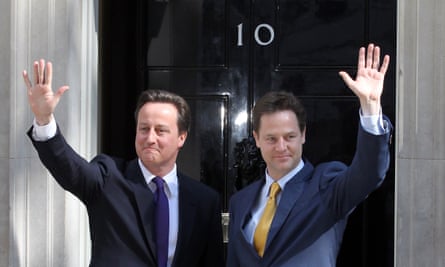
The problem is, Clegg says, he didn’t understand the importance of the political symbols, from the Rose Garden press conference with Cameron (which came across as more bromance than business) to his acceptance of a nothingy office with no front entrance (Cameron refused to allow him to use Downing Street as a backdrop for media interviews).
Clegg was so busy justifying the Lib Dems’ role as a restraining agent that he forgot to tell the public they were in power. “It is something I mistakenly played up to. We portrayed ourselves as a political prophylactic, rather than an agent of change.” Actually, he says, the coalition negotiations were a triumph. The Tories agreed to virtually all the Lib Dems’ demands: fixed-term parliaments, scrapping ID cards, a referendum on electoral reform, measures to tackle climate change. “At the outset, it felt like a genuinely composite government. We got more of our policies into the coalition agreement than they did. And that shows both the strengths and weaknesses of me as a leader, and us as a party, in that we were diligently ticking off the number of policies. But we learned in hindsight that you can get as many of your policies in, but if there’s one policy you don’t, notably tuition fees, that’s the thing people remember.”
But reading the coalition agreement, it looks as if the Lib Dems knew from the start that they would be screwed on tuition fees. The final paragraph, under the heading Education, reads: “If the response of the government to Lord Browne’s report [the review into higher education funding] is one that Liberal Democrats cannot accept, then arrangements will be made to enable Liberal Democrat MPs to abstain in any vote.” In the event, Clegg did not abstain on the vote to increase tuition fees (from £3,290 a year to a maximum of £9,000); six months into government, he voted in favour.
In his book, Clegg accuses Cameron, whom he broadly likes, of hypocrisy, claiming to care about climate change and Europe and the poor, then kowtowing to the right wing of his party. Is it true that when Clegg suggested there needed to be more social housing, Cameron told him it only turned people away from the Tories? “It would have been in a Quad meeting [the committee of Cameron, George Osborne, Clegg and Danny Alexander], so either Cameron or Osborne. One of them – I honestly can’t remember whom – looked genuinely nonplussed and said, ‘I don’t understand why you keep going on about the need for more social housing – it just creates Labour voters.’ They genuinely saw housing as a Petri dish for voters. It was unbelievable.”
Before long, he says, he was dealing with a very different Tory party from the one with which he went into government. He initially found Osborne bright, funny and empathetic. “One of the gifts he has is the ability to think of politics from someone else’s point of view, which is genuinely unusual, and why he was such a consummate dealmaker.” But their relationship soured. “What I found offputting was the callousness to his political calculations, particularly around welfare. Welfare for Osborne was just a bottomless pit of savings, and it didn’t really matter what the human consequences were, because focus groups had shown that the voters they wanted to appeal to were very anti-welfare, and therefore there was almost no limit to those anti-welfare prejudices. I found that very unattractive, very cynical.”
He also accuses Theresa May of distorting figures to stoke up anti-immigrant feeling. “The Home Office produced a report called Free Movement. It was all about giving red meat to their backbenchers on Europe. She kept saying there was this terrible ‘abuse’ of freedom of movement, when simply describing EU citizens exercising their right to come and work in the UK. They tried to insert statistics suggesting the number of UK citizens living and working in other EU countries was half a million lower than any other mainstream estimate.”
Who does he think comes out worst in his book? Clegg looks appalled: “It’s not that kind of book.”
It is, I say.
“No, it’s not,” he says, firmly. “I don’t know. You tell me.”
“M…” I begin.
He grins. “Oh, gosh, yes, Michael Gove. Yep, you’re probably right. Fair enough.”
The stories are endless: from Gove hiding in the toilet when Lib Dem education minister David Laws visits him, to Gove leaking apocryphal stories about González Durántez to the press, and announcing the return of O-levels on a whim. Clegg tells me Gove was cultured and often had him in stitches, but then he goes for him.
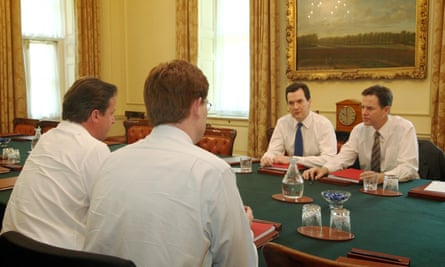
“The more I governed with Gove and his team, the more I realised he was just striking a series of superficial poses. You’ve got a generation of politicians very close to the media, people like Boris Johnson and Gove, and the problem is, the skill of tossing off 800 words on one subject and then on another a week later is completely different to governing. With Cameron and Osborne, there was a seriousness about what they were doing – a deadly seriousness I often didn’t like. But with Gove it was just a series of throwaway poses about our kids’ futures. There’s this ersatz intellectual heft that Gove and his people have that I don’t think is merited.
“People such as Gove and Johnson have elevated striking poses into a political art form. Their apogee was the referendum. I wanted Gove to win the party leadership. He won the argument, and he should have been in a position of power to face the music.”
Clegg recently revealed that Gove was responsible for leaking a story about a supposed conversation Clegg had with the Queen (with Gove present), in which she tore a strip off him for being so unquestioningly pro-European, and suggested she was a Brexiteer – a conversation Clegg insists never happened. “It was complete rubbish. I was lucky enough to be president of the privy council, so I had the huge honour of meeting the Queen pretty well monthly for five years. I don’t remember every conversation we had, but would I remember if I had received this tongue-lashing? Of course I would. And I don’t.”
How does he know the story came from Gove? “The other source of the Sun’s story told me.”
Of all our recent British political leaders, Clegg is the most bracingly European. He speaks fluent Spanish, Dutch, French and German. His half-Russian father, a descendant of Tsarist nobility, was a successful banker; his Dutch mother had lived in Indonesia, where she and her family were interned in a Japanese prisoner-of-war camp during the second world war. Clegg attended Westminster public school, where he was a keen actor, appearing with Helena Bonham Carter in a production of The Changeling (she accidentally kicked him in the balls). He studied archaeology and anthropology at Cambridge university, where he appeared in a play about Cyrano de Bergerac under the directorship of Sam Mendes. There is still something actorly about him. At times, when he asserts himself, his voice shifts from urbane political class to a rasping Ray Winstone.
Clegg went on to study at the University of Minnesota and then the prestigious College of Europe in Bruges, where he met Miriam, today regarded as a leading expert on European trade law. After working for the European Commission, Clegg became a Lib Dem MEP for the East Midlands, and in 2005 won a seat as MP for Sheffield Hallam. Astonishingly, two years later he was leader of the party. Now 49, he looks both young and old for his age – boyish but jowly, with white chest hair prodding through his T-shirt, and surprisingly hairy ears. He has a bad back, and regularly asks if we can stand up or walk around to ease his discomfort.
Again, he talks of the viciousness of the personal attacks on him. At one point, Labour MP Barry Gardiner stood up in parliament and called him a quisling. (Vidkun Quisling was the head of Norway’s government who collaborated with the Nazis.) Did he challenge Gardiner? “No,” Clegg says quietly. “I think I should have. The advice you get in the frontline of politics is, don’t answer back.”
Are you saying that if you had somebody round for dinner and they called you a quisling, you wouldn’t fight back? He smiles apologetically. “I’d probably get up and lamp them,” he says. “With hindsight, I should have been more outspoken. There’s a very British culture in Westminster where people say unspeakably beastly things to each other in the Chamber, then, when they shuffle next to each other for a cup of tea, they talk about the weather. I’m too Dutch for that.” Only he wasn’t: he took it on the chin.
Does he feel a bit sorry for himself? He pulls himself up, straight-backed, and momentarily morphs into the Major from Fawlty Towers. “No. Never have done. Wasn’t brought up like that. You get on with things and take the knocks. Look, it was a fantastic privilege to do what I did. I’m very lucky. I’m absolutely besotted with my kids, and I survived more or less with my limbs still attached to my body.”
As if on cue, a procession of mini-Cleggs strolls by the cafe. His gorgeous boys (14-year-old Antonio, 12-year-old Alberto and seven-year-old Miguel), accompanied by Miriam and her mother, stop to chat. Miriam asks how my flight was, Antonio tells me Manchester United will win the league now that they’ve signed Paul Pogba. And then they are on their way. “See you later,” Miriam says. Clegg looks at Miriam adoringly, as if he still can’t quite believe his luck. “I was smitten by her the first day,” he says. “Bowled over. Love at first sight. She didn’t speak a word of English; our early courtship was in French. She kept telling me stories I couldn’t quite follow. I was so bewitched, it made no difference.”
Miriam recently wrote a warts-and-all cookbook, Made In Spain, in which she revealed that the Camerons had wanted to be friends, but she wasn’t really up for it; that Samantha Cameron had served the Cleggs roast chicken with a tube of Hellmann’s mayonnaise, rather than making her own; and that she had refused to be in the house, let alone cook, when Osborne visited (Clegg and the then chancellor had a takeaway). Was it embarrassing when Miriam refused to stay around for Osborne? “Not at all,” Clegg says, his voice rising again. “My embarrassing thing is that I’ve not actually read what Miriam said in her book,” he says by way of a diversion. “I remember her leaving as George came. But she didn’t stalk off. She went out with friends, having put the kids to bed.”
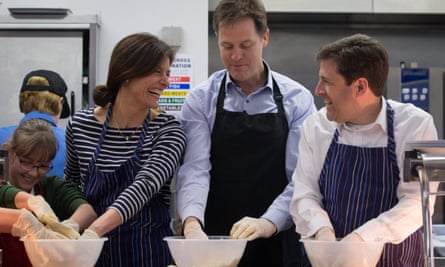
Where does he stand on Hellmannsgate? “To be fair to Miriam, unless you’re very sensitive about your own mayonnaise, I don’t think that counts as score-settling.”
In 2014, Lib Dem peer Matthew Oakeshott suggested the party would do better under a new leader and attempted to orchestrate a coup against Clegg. Others, no more favourably disposed, told the deputy PM that he’d made his bed and had better lie in it. How much did it take out of him? A lot, he says. In the book, he writes that by 2011 he was working long hours, smoking too much and putting on weight. How many cigarettes? Sometimes three to five a night, he says. There’s something touching about the fact that even his excess is so modestly calibrated. How much weight did he put on? “I didn’t weigh myself, Simon! But Paddy Ashdown told me very sternly, ‘You’re too fat.’” Did he have to get bigger trousers? “Yes.”
Did he consider resigning? “I didn’t think, in spring 2011, when I was feeling so shit and was fat and whatever, that I should quit. But there were several times in the last two or three years when I thought long and hard about whether that was the right thing to do. In the end, I thought, it’s the worst of both worlds: you’ve created a government that lots of people heap opprobrium on you for, and then you quit when you’ve got nothing to show for it.”
He felt that leading players Vince Cable and Chris Huhne failed to give him their full support. (Cable seemed to be preparing to take over the leadership, while Huhne didn’t help matters when he ended up in prison for perverting the course of justice.) “Well, I don’t think Vince and Chris would ever count themselves as great team players,” Clegg says.
If I was skippering the Lib Dems, I say, I’d want team players on my side. “Well, it’s not like that, is it? Vince’s strength, and the reason he’s liked by the public, was precisely because he stood apart. So there was no point in me saying, ‘Oh, Vince, can you put in a shift in the boiler room with the rest of the team?’ What I did was give them both big departmental responsibilities.”
However much Clegg points the finger at a treacherous Tory leadership or the recalcitrant big beasts in his own party, he knows that ultimately there is one person to blame for his failures: himself. The day he agreed to triple tuition fees, he lost credibility. Isn’t it easy to promise to freeze fees when you think you’ll never be in power? “Yes, clearly,” he concedes. “And when we made that commitment, I didn’t think it was very sensible. Nor did Vince.”
You sold yourself as the politician youngsters could trust and you ended up being defined by…
He finishes my sentence: “A lack of trust.”
Clegg argues there will always be something on which the smaller party in a coalition fails to deliver. But this is different, I say. It wasn’t about failing to deliver, it was about doing something you expressly promised not to. “Yes. Right. Yes, I see what you mean. My hunch is, the reason why the tuition fees thing enraged people as much as it did – and for some people still does, because it’s so personal to people – is that it’s their sons, their daughters. Getting your kids into university, seeing them in a gown on the mantelpiece, it’s the distillation of a better life for your children. I have spent a lot of time thinking about the emotional pungency of it. It’s like a politician coming out of the television going ‘Bang!’ [he makes a fist with one hand and delivers a knockout blow to the other] to my face as a parent. That’s my explanation.”
Does he replay the conversation he had with Cameron when he agreed to the increase, and come up with alternative scenarios? “Yeah, of course. One of the many lessons I’ve learned is that you can’t just spring things on people if they don’t see there is a problem in the first place. We just sprung this massive change on how we were going to fund our universities, without explaining there was a crisis in university funding. So often I do wonder what would have happened if we’d just pushed the university sector over the edge and said, we’re not going to help you out, we’re not going to give you a perfectly formed solution.”
So he conceded to Cameron too quickly? “Far too quickly. We should have let the universities talk about it, and yes, there would have been egg on my face, I would have had to swallow my pride. But at least we could have said, ‘Listen, we are responding to an urgent problem.’”
So many of those students who placed that hope in him have since dumped him for Corbyn. They could have been his, I say. “Yes. Yep.” Is that his biggest regret? “Yes, of course it’s a huge regret, but that is not just a phenomenon in Britain. What you’re seeing across the developed world, particularly among university-educated youngsters active on social media, is a movement from one figure of hope who can deliver the next Jerusalem to the next.”
Now he has to look to his own future. “My days of leadership are over. I promise you, having been as battle hardened as I have – do you mind if I stand up? – I’m not hankering for another go in the trenches.” Tim Farron, the current Lib Dem leader, has given Clegg the job of scrutinising the government’s Brexit strategy and holding it to account. He is keen to do that, and says that if there is a snap election, he will defend his seat in Sheffield Hallam. Beyond that, he doesn’t have a clue; he’s too young for a bit-part life and wants a new career.
I ask if the day after the 2015 general election was his lowest point. “Well, you can’t get much lower than that,” Clegg says. But no, it wasn’t. “I felt more wretched after the referendum than after the election. Political parties go up and down. Dare I say it, it’s not the end of the world. I immediately fell on my sword after the election, took responsibility, but we will come back. We already are. But on the 23rd of June we lost something for good as a country, which I feel much more strongly about. You can’t undo a lot of that damage.”
He walks me back to the bus station at the edge of town. I tell him I still think his biggest regret is the fact that all those young voters now feel he betrayed them. No, he says, I’m being sentimental: he’s more ruthless than I want to believe. His real regret is failing to deliver constitutional reform. As for tuition fees, if it hadn’t been that, it would have been another issue that would have killed off Cleggmania. But the people he is interested in are those still convinced that coalition government can work – messy, compromised and occasionally shaming, but always serious politics. And if you believe in governing alongside parties you disagree with, as he does, you can never hope to emerge blemish-free. Actually, he says, the reality, is even less heroic. “There is absolutely no way that you can maintain a steadfast reputation for integrity.”
‘No wonder there was a Nick Clegg Looking Sad website’: an exclusive extract from his revealing new book
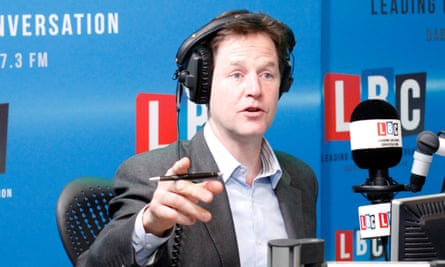
David Cameron seemed a little on edge. We were alone in his study in Number 10, very shortly after the formation of the coalition, and he wanted to ask me something that had clearly been preying on his mind. “This is terribly awkward,” he admitted. “The thing is… George has for so long had his eye on Dorneywood… He’s very close to me… Would you mind if he used Dorneywood instead of you?” He then proposed that I share the foreign secretary’s traditional grace-and-favour countryside retreat, Chevening, rather than Dorneywood, which was ordinarily used by the number two in government.
I was a bit taken aback. I thought he wanted to ask me something important. It hadn’t really occurred to me that I might get a retreat to use at weekends, still less that there was any great distinction between one or the other. Cameron’s plea suggested that George Osborne had been measuring up the curtains for years.
I accepted the new arrangement and found myself sharing Chevening, a grand mansion in the Kent countryside near Sevenoaks, for the next five years with the foreign secretary, first William Hague and later Philip Hammond. Not at the same time, I hasten to add; that would have been taking coalition a little too far.
Whether or not occupying Dorneywood made any difference to anything, I couldn’t say. But, like Westminster itself, many of the so-called trappings of power – grace-and-favour mansions, grand offices, ministerial Jaguars – can seem completely alien to people who have not spent their lives preparing for power. As such, it is easy to underestimate their importance.
When it was suggested that I take an office with no publicly recognisable entrance of its own, I didn’t mind, as I thought I wouldn’t need an equivalent of the Number 10 door at which to receive guests. When it was decided where I would sit in the House of Commons at Prime Minister’s Questions, I thought it made sense to sit supportively next to the PM, to show that the coalition could work smoothly.
Big mistakes. All of them.
From the outside, the first day of the coalition government looked just about as smooth a transition of power as you could wish for, but behind closed doors it was anything but. With the negotiations wrapped up in just five days, the prime minister and I spent the morning of Wednesday, 12 May 2010 in Downing Street, appointing ministers to our first cabinet, before sharing the stage in the sun-drenched Rose Garden. When Cameron turned to me shortly afterwards and told me that, “We may have overdone it a bit”, he was probably right. It was easy to get a little carried away with the “new dawn” feel of the occasion. But I soon found out that not only was I physically unprepared for government; government was physically unprepared for me.
On that first day in Downing Street, there was no office waiting for me. The in-house team at Number 10 quickly switched into gear for the incoming prime minister, but had little idea how to handle a deputy prime minister sharing power at the top. I was ushered upstairs to one of the first-floor state rooms. There I spent several hours, accompanied by Danny Alexander and a small number of my closest advisers, while the civil service buzzed around the building, supporting the new PM and largely ignoring us. There wasn’t even a phone.
While the 200 or so staff in Downing Street leapt into action to support the new prime minister, I was given just a single civil servant. My mistake, at least at first, was to accept the model presented to me. Having negotiated the coalition agreement without the help of civil servants, and with no experience in government myself, I simply didn’t see the need to surround myself with teams of officials. And having witnessed the infantile Whitehall turf war waged by Gordon Brown’s courtiers against Tony Blair, I thought it best to avoid rival power centres.
The most unforgiving consequence was the tsunami of paperwork that fell directly to me to contend with. I was asked my opinion on things I didn’t have the remotest clue about – dense, technical issues to do with the mechanics of everything from local government finance to energy subsidies. Every evening I would plonk myself on the sofa at home with my box and sit there dutifully wading through it, as family life happened around me. I would stay there virtually every night until the early hours. Then I would grab a few hours’ sleep, which were disturbed most nights by our then one-year-old son Miguel, only to get up early to help get our two older boys fed, changed and packed off to school.
The effect was not only physically draining, it was politically debilitating, too. Very quickly it became obvious that the central nervous system of Whitehall lay in the daily negotiations between me and Cameron. At the same time, the two most senior Liberal Democrats in the cabinet, Vince Cable and Chris Huhne, were, notwithstanding their obvious intellectual strengths, not known as nature’s keenest team players. From the outset, their focus was devoted to their own departments – and their own political reputations. While they did this to great effect (and I encouraged them to do so), it meant I was unable to rely on others to defend in the media what we were doing. I soon became such a focal point for anger that I felt the impulse to defend myself publicly. No wonder Osborne said, somewhat smugly, in an interview in 2011 that, having expected to become British politics’ public enemy number one, he “hadn’t reckoned on Nick Clegg”.
I never contacted newspaper editors in response to negative coverage about myself. My only exception to this rule was when my family was affected. Every few weeks, Miriam and I had to devote a fair amount of time and emotional energy to rebutting ludicrous claims: that Miriam was somehow responsible for human-rights abuses in Western Sahara; that she was guilty of tax irregularities in her law firm several years before she was even employed by it; that our decision to send our Catholic children, who had attended a Catholic primary school, to a Catholic secondary school was a sign of hypocrisy. And so on.
I mistakenly assumed that if I worked hard within government, did my homework and took decisions on their merits, then, one way or another, the truth – that the coalition was acting out of reasonable motives – would become plain to see and political dividends would follow. What I did not anticipate was what actually happened: I did all that – and no one knew about it. This enabled critics from the left to lampoon the Liberal Democrats as spineless, and critics from the right to lambast us as illegitimate irritants who shouldn’t have been in government in the first place. The public readily turned away from us. I failed to realise an interesting paradox of modern politics: in an age of unprecedented transparency, the reality of power can still remain obscure to the public.
By the spring of 2011, I was both drained and physically unfit. I smoked several cigarettes a night. I got virtually no exercise. Since becoming leader of the Liberal Democrats, I had dealt with pneumonia, chest pains, a broken toe, chronic coughs and bronchitis, while trying to look perky in public at all times. And throughout all of this, I would regularly crisscross London in the early evening to help put our three young boys to bed before returning to Westminster. No wonder there was a Nick Clegg Looking Sad website. They could have added Nick Clegg looking fat, pale and unhealthy, too.
Over time, I worked out a better balance. I employed a larger team; I took up weekly kickboxing classes and had a rowing machine installed in a cubbyhole near my office; I cut down on the cigarettes and started to eat better. I handled the vast amount of paperwork more effectively by tackling most of it early in the morning instead of late at night, a switch of technique I later discovered Cameron had adopted, too.
I discovered that one of the best ways to master the dysfunctional worlds of Westminster and Whitehall was simply to work outside them as much as possible. I restarted my pre-election habit of holding public question-and-answer sessions. I even started my own call-in show on LBC Radio with the veteran presenter Nick Ferrari. It was condemned as a foolish risk by many in the Westminster village, yet quickly proved to be sufficiently popular that a number of other politicians followed suit.
Much of what I have described might seem like the footling ephemera of political life. But I believe it lifts the lid on something more serious: politics is already populated by a surfeit of political professionals and apparatchiks; if we want people with an independent turn of mind who have led normal lives to represent our country in the future, there will need to be a shift. If every youthful misdemeanour is recycled on social media for ever, if the dysfunctional operation of Whitehall continues to expect too much of people at the top, and if politicians cannot protect their loved ones, we should not be surprised if in future parliament is populated by robots, monks and nuns.
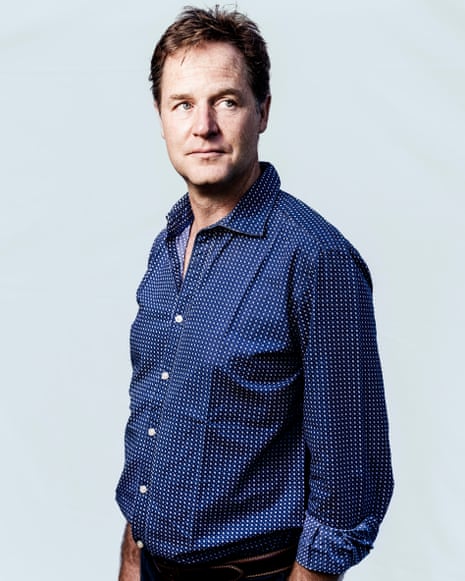
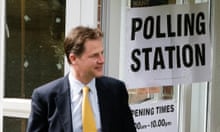

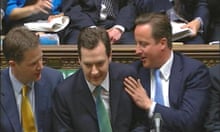

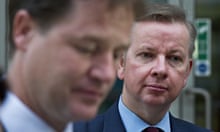


Comments (…)
Sign in or create your Guardian account to join the discussion